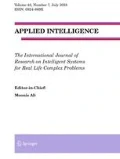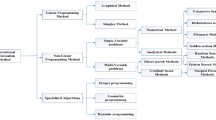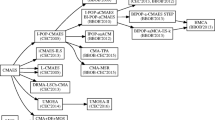Abstract
Inspired by the completely different motional features of individuals in three different phases of nature, i.e. gas phase, liquid phase and solid phase, this paper presents a phase based evolutionary model. Based on the proposed model, a specific implementation termed Phase Based Optimization (PBO) was systematically given. Meanwhile, the search behavior analysis and the evolution process of population are provided to further understand the search mechanisms of PBO. To evaluate the performance of PBO, numerical experiments are carried out on twenty-three benchmark test functions consisting of different types of unimodal and multimodal functions. The obtained results demonstrate the better performance of PBO compared with eight state-of-the-art nature-inspired optimization algorithms. Besides, the effects of population size on PBO and the performance comparison of PBO under different problem dimensions are systematically investigated, respectively. Finally, PBO is applied to two application problems which are parameter estimation for frequency modulated sound waves synthesis and large scale transmission pricing problem, and the promising results indicate the applicability of PBO in both low and high dimensional real-world optimization problems.













Similar content being viewed by others
References
Civicioglu P (2013) Backtracking search optimization algorithm for numerical optimization problems. Appl Math Comput 219(15):8121–8144
Zou F, Wang L, Hei X (2014) Teaching-learning-based optimization with dynamic group strategy for global optimization. Inform Sci 273:112–131
Holland JH (1975) Adaptation in natural and artificial systems. University of Michigan, MIT Press
Beyer HG, Schwefel HP (2002) Evolution strategies-A comprehensive introduction. Nat Comput 1(1):3–52
Fogel D (1966) Artificial intelligence through simulated evolution. In: National conference on emerging trends & applications in computer science. Wiley-IEEE Press, pp 227–296
Angeline PJ (1994) Genetic programming: on the programming of computers by means of natural selection. Biosystems 33(1):69–73
Storn R, Price K (1997) Differential evolution-a simple and efficient heuristic strategy for global optimization over continuous spaces. J Glob Optim 11(4):341–359
Kennedy J, Eberhart R (1995) Particle swarm optimization. In: IEEE international conference on neural networks (ICNN), Perth, Australia, pp 1942–1948
Dorigo M (1992) Optimization, learning and natural algorithms. Ph.D Dissertation (in Italian), Politecnico di Milano, Italy
Simon D (2008) Biogeography-based optimization. IEEE Trans Evol Comput. 12(6):702–713
Rashedi E, Nezamabadi-pour H, Saryazdi S (2009) GSA: A gravitational search algorithm. Inform Sci 179(13):2232–2248
Eskandar H, Sadollah A, Bahreininejad A (2012) Water cycle algorithm-A novel meta-heuristic optimization method for solving constrained engineering optimization problems. Computers & Structures 10:151–166
Wolpert DH, Macready WG (1997) No free lunch theorems for optimization. IEEE Trans Evol Comput 1 (1):67–82
Meng XB, Gao XZ, Lu LH (2016) A new bio-inspired optimisation algorithm: Bird Swarm Algorithm. J Exp Theor Artif Intel 28(4):673–687
Cao ZJ, Wang L, Hei XH (2016) A phase based optimization algorithm for big optimization problems. In: 2016 IEEE congress on evolutionary computation (CEC), pp 5209–5214
Jeans J (1982) An introduction to the kinetic theory of gases. Nature 8(146):535–536
Woolf HB (1979) Webster’s new collegiate dictionary. G.& C. Merriam Co., Springfield, pp 665–666
Martin OC, Monasson R, Zecchina R (2001) Statistical mechanics methods and phase transitions in optimization problems. Theor Comput Sci 265:3–67
Oxtoby DW, Gillis HP, Campion A (2008) Principles of modern chemistry, 6th. Thomson Brooks Cole, Singapore, pp 428–30
Yang XS (2014) Nature-Inspired Optimization Algorithms. Elsevier
Civicioglu P (2012) Transforming geocentric Cartesian coordinates to geodetic coordinates by using differential search algorithm. Comput Geosci 46(9):229–247
Rozenberg G, Bäck T, Kok JN (2012) Handbook of natural computing. Springer Berlin Heidelberg
Passino KM (2002) Biomimicry of bacterial foraging for distributed optimization and control. IEEE Control Syst 22(3):52–67
Karaboga D, Basturk B (2007) A powerful and efficient algorithm for numerical function optimization: artificial bee colony (ABC) algorithm. J Glob Optim 39(3):459–471
He S, Wu QH, Saunders JR (2009) Group search optimizer: an optimization algorithm inspired by animal searching behavior. IEEE Trans Evol Comput 13(5):973–990
Yang XS, Gandomi AH (2012) Bat algorithm: a novel approach for global engineering optimization. Eng Comput 29(5):464–483
Gandom A (2014) Bird mating optimizer: An optimization algorithm inspired by bird mating strategies. Commun Nonlinear Sci Numer Simul 19(4):1213–1228
Mirjalili S (2015) How effective is the Grey Wolf optimizer in training multi-layer perceptrons. Appl Intell 43 (1):150–161
Shi YH (2011) Brain storm optimization algorithm. In: Second international conference of Swarm intelligence, pp 303–309
Kirkpatrick S, Gelatt J, Vecchi MP (1983) Optimization by Simulated Annealing. Science 220 (4598):671–680
Lee KS, Geem ZW (2005) A new meta-heuristic algorithm for continuous engineering optimization: harmony search theory and practice. Comput Methods Appl Mech Eng 194(36):3902– 3933
Zheng YJ (2015) Water wave optimization: A new nature-inspired metaheuristic. Comput Oper Res 55:1–11
Shah-Hosseini H (2009) The intelligent water drops algorithm: a nature-inspired swarm-based optimization algorithm. International Journal of Bio-Inspired Computation 1(1):71–79
Zandi Z, Afjei E, Sedighizadeh M (2012) Reactive power dispatch using big bang-big crunch optimization algorithm for voltage stability enhancement. In: IEEE international conference on power and energy, p 239244
Lam AYS, Li VOK (2010) Chemical-reaction-inspired metaheuristic for optimization. IEEE Trans Evol Comput 14(3):381–399
Maadi M, Javidnia M, Ramezani R (2018) Modified Cuckoo optimization algorithm to solve precedence constrained sequencing problem. Appl Intell 48(6):1407–1422
Solis F, Wets R (1998) Minimization by random search techniques. Math Oper Res 6(1):19–30
He J, Yu X (2001) Conditions for the convergence of evolutionary algorithms. J Syst Archit 47(7):601–612
Yao X, Liu Y, Lin GM (1999) Evolutionary programming made faster. IEEE Trans Evol Comput 3 (2):82–102
Qian W, Chai J, Xu Z (2018) Differential evolution algorithm with multiple mutation strategies based on roulette wheel selection. Appl Intell 4(1):1–18
Qin Q, Cheng S, Zhang Q et al (2016) Particle swarm optimization with interswarm interactive learning strategy. IEEE Trans Cyber 46(10):2238–2251
Derrac J, García S, Molina D, Herrera F (2011) A practical tutorial on the use of nonparametric statistical tests as a methodology for comparing evolutionary and swarm intelligence algorithms. Swarm and Evolutionary Computation 1(1):3–18
Alcalá-Fdez J, Sánchez L (2008) KEEL: A software tool to assess evolutionary algorithms to data mining problems. Soft Comput 13(3):307–318
Hoare MR (2007) Structure and dynamics of simple micro-clusters. Adv Chem Phys 40(1):49–135
Rueda JL, Erlich I, González-Longatt F (2015) Performance assessment of evolutionary algorithms in power system optimization problems. IEEE Power Tech, 1–5
Das S, Suganthan PN (2011) Problem definitions and evaluation criteria for CEC 2011 competition on testing evolutionary algorithms on real world optimization problem. Dept. Electron. Telecommun. Engg., Jadavpur Univ., Kolkata, India, Tech. Report
Acknowledgments
This research work was partially supported by National Natural Science Foundation of China (Grant No. 61773314, 61672027, 61703332, 61572392), Key research and development plan project of Shaanxi Science and Technology Department (Grant No. 2017ZDXM-GY-016) and the Project of Department of Education Science Research of Shaanxi Province (Grant No. 17JK0371).
Author information
Authors and Affiliations
Corresponding author
Ethics declarations
Conflict of interests
All the authors declare that they have no conflict of interest.
Rights and permissions
About this article
Cite this article
Cao, Z., Wang, L. A comprehensive study of phase based optimization algorithm on global optimization problems and its applications. Appl Intell 49, 1355–1375 (2019). https://doi.org/10.1007/s10489-018-1306-z
Published:
Issue Date:
DOI: https://doi.org/10.1007/s10489-018-1306-z




